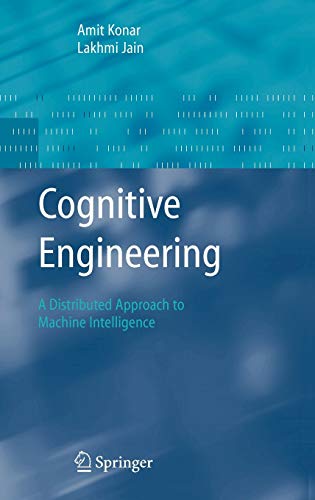Cognitive Engineering: A Distributed Approach to Machine Intelligence (Advanced Information and Knowledge Processing) - Tapa dura

Sinopsis
What we profoundly witness these days is a growing number of human-centric systems and a genuine interest in a comprehensive understanding of their underlying paradigms and the development of solid and efficient design practices. We are indeed in the midst of the next information revolution, which very likely brings us into a completely new world of ubiquitous and invisible computing, Ambient Intelligent (AMI), and wearable hardware. This requires a totally new way of thinking in which cognitive aspects of design, cognitive system engineering and distributed approach play a pivotal role. This book fully addresses these timely needs by filling a gap between the two well-established disciplines of cognitive sciences and cognitive systems engineering. As we put succinctly in the preface, with the psychological perspective of human cognition in mind, "the book explores the computational models of reasoning, learning, planning and multi-agent coordination and control of the human moods". This is an excellent, up to the point description of the book. The treatise is focused on the underlying fundamentals, spans across a vast territory embracing logic perspectives of human cognition, distributed models, parallel computing, expert systems, and intelligent robotics.
"Sinopsis" puede pertenecer a otra edición de este libro.
De la contraportada
Cognitive Engineering: A Distributed Approach to Machine Intelligence explores the design issues of intelligent engineering systems. Beginning with the foundations of psychological modeling of the human mind, the main emphasis is given to parallel and distributed realization of intelligent models for application in reasoning, learning, planning and multi-agent co-ordination problems. The last two chapters provide case studies on human-mood detection and control, and behavioral co-operation of mobile robots. This is the first comprehensive text of its kind, bridging the gap between Cognitive Science and Cognitive Systems Engineering.
Each chapter includes plenty of numerical examples and exercises with sufficient hints, so that the reader can solve the exercises on their own. Computer simulations are also included in most chapters to give a clear idea about the application of the algorithms undertaken in the book. In addition, mathematical analysis on convergence and stability of the neuro-fuzzy models will enable the reader to pursue their research career in cognitive engineering.
Cognitive Engineering: A Distributed Approach to Machine Intelligence is unique in its theme and contents, and includes a Foreword by Professor Witold Pedrycz - written with graduates in mind, this book would also be a valuable resource for researchers in the fields of Cognitive Science, Computer Science and Cognitive Engineering.
"Sobre este título" puede pertenecer a otra edición de este libro.
Otras ediciones populares con el mismo título
Resultados de la búsqueda para Cognitive Engineering: A Distributed Approach to Machine...
Cognitive Engineering
Librería: Books Puddle, New York, NY, Estados Unidos de America
Condición: New. pp. 372. Nº de ref. del artículo: 26253321
Comprar nuevo
Cantidad disponible: 1 disponibles
Cognitive Engineering : A Distributed Approach To Machine Intelligence
Librería: Romtrade Corp., STERLING HEIGHTS, MI, Estados Unidos de America
Condición: New. This is a Brand-new US Edition. This Item may be shipped from US or any other country as we have multiple locations worldwide. Nº de ref. del artículo: ABNR-156408
Comprar nuevo
Cantidad disponible: 1 disponibles
Cognitive Engineering : A Distributed Approach To Machine Intelligence
Librería: Basi6 International, Irving, TX, Estados Unidos de America
Condición: Brand New. New. US edition. Expediting shipping for all USA and Europe orders excluding PO Box. Excellent Customer Service. Nº de ref. del artículo: ABEOCT25-223700
Comprar nuevo
Cantidad disponible: 1 disponibles
Cognitive Engineering
Librería: Majestic Books, Hounslow, Reino Unido
Condición: New. pp. 372 Illus. Nº de ref. del artículo: 7627350
Comprar nuevo
Cantidad disponible: 1 disponibles
Cognitive Engineering
Librería: Biblios, Frankfurt am main, HESSE, Alemania
Condición: New. pp. 372. Nº de ref. del artículo: 18253315
Comprar nuevo
Cantidad disponible: 1 disponibles
Cognitive Engineering: A Distributed Approach to Machine Intelligence (Advanced Information and Knowledge Processing)
Librería: Phatpocket Limited, Waltham Abbey, HERTS, Reino Unido
Condición: Good. Your purchase helps support Sri Lankan Children's Charity 'The Rainbow Centre'. Ex-library, so some stamps and wear, but in good overall condition. Our donations to The Rainbow Centre have helped provide an education and a safe haven to hundreds of children who live in appalling conditions. Nº de ref. del artículo: Z1-R-006-01708
Comprar usado
Cantidad disponible: 1 disponibles
Cognitive Engineering: A Distributed Approach to Machine Intelligence (Advanced Information and Knowledge Processing)
Librería: ALLBOOKS1, Direk, SA, Australia
Brand new book. Fast ship. Please provide full street address as we are not able to ship to P O box address. Nº de ref. del artículo: SHAK223700
Comprar nuevo
Cantidad disponible: 1 disponibles
Cognitive Engineering: A Distributed Approach to Machine Intelligence (Advanced Information and Knowledge Processing)
Librería: Lucky's Textbooks, Dallas, TX, Estados Unidos de America
Condición: New. Nº de ref. del artículo: ABLIING23Mar2912160256931
Comprar nuevo
Cantidad disponible: Más de 20 disponibles
Cognitive Engineering : A Distributed Approach to Machine Intelligence
Librería: GreatBookPrices, Columbia, MD, Estados Unidos de America
Condición: New. Nº de ref. del artículo: 3497253-n
Comprar nuevo
Cantidad disponible: Más de 20 disponibles
Cognitive Engineering: A Distributed Approach to Machine Intelligence (Advanced Information and Knowledge Processing)
Librería: Ria Christie Collections, Uxbridge, Reino Unido
Condición: New. In. Nº de ref. del artículo: ria9781852339753_new
Comprar nuevo
Cantidad disponible: Más de 20 disponibles

